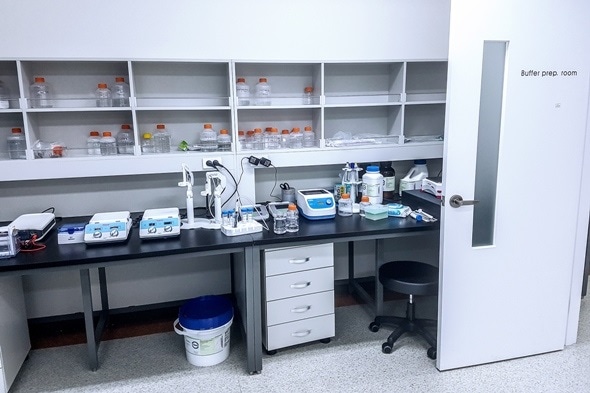Oct 16 2017
New Avantor Korea Laboratory is focused on optimizing biopharmaceutical purification processes for customers in the rapidly expanding life sciences industry in South Korea
Avantor®, a global supplier of ultra-high-purity materials for customers across the life sciences and advanced technologies sectors, recently opened a new life sciences research and applications laboratory in the GwangGyo district, Suwon, South Korea.

Located near local pharmaceutical and biopharmaceutical research and production customers, the Avantor Korea Lab offers both in-house and field service applications development support.
The Avantor Korea Laboratory will help biopharmaceutical and pharmaceutical customers improve the efficiency of their purification processes, with an initial focus on helping them optimize Avantor’s high-performance resins, buffers and other materials used in their production systems.
This specialized lab features state-of-the-art life sciences research tools, expert scientists, application specialists and resources and accommodations to provide on-site training for topics such as biopharmaceutical drug development, process validation and regulatory compliance.
“We created the new Avantor Korea Laboratory to enable more collaboration with our customers in Korea’s fast-growing life sciences industry,” said Devashish Ohri, Executive Vice President, APAC and MEA for Avantor. “Our goal is to help optimize process efficiency and yields, solve drug development bottlenecks and create integrated solutions to address customer business objectives.”
Process development and optimization is one area in which the Avantor Korea Laboratory researchers will work closely with customers. Avantor researchers will collaborate on ways to use the company’s process chromatography media, buffers and salts to define the best conditions for the highest protein purity and protein yield.
“With more than 30 years of experience in process chromatography, we’ve developed multi-mode chemistry that works to increase yield by improving purification process efficiency and also enhancing selectivity by removing closely related impurities,” said Nandu Deorkar, Vice President, Research and Development for Avantor. “We will apply that experience to the challenges our Korean life sciences customers hope to solve.”
The Avantor Korea Laboratory also provides process optimization expertise through its newly launched Field Application Services (FAS) programs. FAS programs cover R&D/Pre-Clinical stage process development as well as Phase I/II/III/Marketed stage processes. These expert, step-by-step services are designed to help improve protein yield and target protein purity, reduce process time and/or steps, and potentially reduce the time from research and development to commercialization of target products.
This new research facility is part of Avantor’s expanding footprint of research and application development laboratories located around the world, including the Bridgewater Innovation Center, the company’s newest North American research lab supporting the development of chemistries and materials for life sciences and advanced technologies customers.
Source: https://www.avantorinc.com/